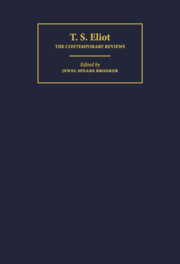Book contents
- Frontmatter
- Contents
- Series Editor's Preface
- Introduction
- Acknowledgments
- Prufrock and Other Observations (1917)
- Poems (1919); Ara Vos Prec (1920); Poems (1920)
- The Sacred Wood: Essays on Poetry and Criticism (1920, 1921)
- The Waste Land (1922)
- Homage to John Dryden (1924)
- Poems 1909–1925 (1925)
- For Lancelot Andrewes: Essays on Style and Order (1928, 1929)
- Dante (1929); Animula (1929); Marina (1930)
- Ash-Wednesday (1930)
- Selected Essays 1917–1932 (1932)
- Sweeney Agonistes (1932)
- The Use of Poetry and the Use of Criticism (1933)
- After Strange Gods: A Primer of Modern Heresy (1934)
- The Rock (1934)
- Murder in the Cathedral (1935)
- Collected Poems 1909–1935 (1936)
- The Family Reunion (1939)
- The Idea of a Christian Society (1939)
- East Coker (1940); Burnt Norton (1941); The Dry Salvages (1941); Little Gidding (1942); Four Quartets (1943)
- Notes Towards the Definition of Culture (1948, 1949)
- The Cocktail Party (1949, 1950)
- The Confidential Clerk (1954)
- The Elder Statesman (1959)
- Index
The Family Reunion (1939)
Published online by Cambridge University Press: 10 March 2010
- Frontmatter
- Contents
- Series Editor's Preface
- Introduction
- Acknowledgments
- Prufrock and Other Observations (1917)
- Poems (1919); Ara Vos Prec (1920); Poems (1920)
- The Sacred Wood: Essays on Poetry and Criticism (1920, 1921)
- The Waste Land (1922)
- Homage to John Dryden (1924)
- Poems 1909–1925 (1925)
- For Lancelot Andrewes: Essays on Style and Order (1928, 1929)
- Dante (1929); Animula (1929); Marina (1930)
- Ash-Wednesday (1930)
- Selected Essays 1917–1932 (1932)
- Sweeney Agonistes (1932)
- The Use of Poetry and the Use of Criticism (1933)
- After Strange Gods: A Primer of Modern Heresy (1934)
- The Rock (1934)
- Murder in the Cathedral (1935)
- Collected Poems 1909–1935 (1936)
- The Family Reunion (1939)
- The Idea of a Christian Society (1939)
- East Coker (1940); Burnt Norton (1941); The Dry Salvages (1941); Little Gidding (1942); Four Quartets (1943)
- Notes Towards the Definition of Culture (1948, 1949)
- The Cocktail Party (1949, 1950)
- The Confidential Clerk (1954)
- The Elder Statesman (1959)
- Index
Summary
*"Mr. Eliot in Search of
the Present."
Times Literary
Supplement 1938
(25 March 1939), 176.
Mr. Eliot must be admired for his persistence in making experiments for a modern verse drama. The box-office success of Murder in the Cathedral may have given him an unexpected and fortunate flip. It is possible, indeed, that he, more than other poets on the scene at the moment, may establish an altered theatre. His work is ritualistic, a thing which will be increasingly appropriate, without doubt, in the coming years. Yet, strangely enough, in his new play, The Family Reunion […], he clings in the text to naturalism of surface and the naturalistic time. For all the versification, he may be said to have hardly broken with the main tenets of Shaftesbury Avenue.
Here we have the fixed drawing-room and library of an English country house. The slight ceremonies of such a place may make a preliminary appeal to Mr. Eliot. The verse is so apologetic it might often hardly be noticed: “She's a nice girl; but it's a difficult age for her. / I suppose she must be getting on for thirty?” This is perhaps an experiment in infiltration, of “getting by” with verse before the Philistines suspect it. It has the flat simplicity of Frost, the studied casualness of certain French men, but it does not seem especially dramatic; nor is it compact. At times it is both clumsy and diffuse, reminding us rather of the novel of analysis, now passing, than of a possible poetic drama.
- Type
- Chapter
- Information
- T. S. EliotThe Contemporary Reviews, pp. 377 - 410Publisher: Cambridge University PressPrint publication year: 2004



